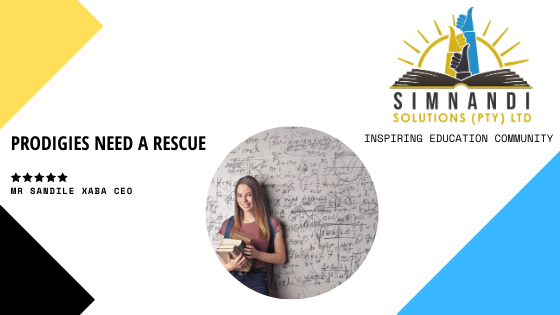Feldman and Morelock (2011) defines a prodigy as a child who, at a very young age performs at an adult professional level in a highly demanding, culturally recognized field of endeavor. Prodigies are young people with exceptional qualities or abilities. They possess an amazing or unusual ability, especially one out of the ordinary course of nature. They are capable to invent things. They can perform professional tasks without being taught to do so – operate an engine, perform electrical engineering duties, write books, show a remarkable excellence in computer etc. These children are brilliant at birth, which then poses a question of – which curriculum best suits prodigies and help them succeed? This paper aims at revealing the curriculum dangers prodigies face. The paper will further share South African prodigies stories and finally discuss the suitable curriculum to nurture prodigies.
Prodigies coming from poor families where they can’t afford private relevant education struggle in public schools. Prodigies are mostly practical and textile learners who learn through picturing in their minds and using their hands thereafter. Education, under the current curriculum system, is theoretical which blocks the prodigies from expressing themselves. Most public schools in SA where they offer Engineering and Graphic Design subject (EGD) the emphasis is theoretical and all they do is draw objects they never get to work with practically. No school ever go out to the sites where the learners can put into action the theoretical knowledge they have acquired in the classroom. What is the use of doing a practical subject if school fails to provide the practical learning aspect of the subject? This is exactly how prodigies are at the disadvantage.
South African schools consist of learners who are passionate about Electrical, Mechanical engineering etc. The sad reality is that these learners are excluded in the curriculum as the practical education process is overlooked. Companies such as Eskom and many automotive companies are forced to train graduates to ensure they can perform the work. The question arises therefore, why are people going to school and universities if they still need training to perform workplace duties? This is a signal of curriculum irrelevancy. The market (employers) have now come to the phenomenon of ‘’internship programme’’. Internship programmes are a conclusive proof that the South African education curriculum system is failing to meet the educational needs of the learners and it also fails to feed the market with the skill equipped workforce (graduates).
Amongst many stories of prodigies in South Africa is Sanelisiwe Sambo, a 14-year-old prodigy from Bushbuckridge in Limpopo, she skipped several grades at school and has always wanted to be an accountant and has now registered for BCom (https://allafrica.com/stories/200402090833.html) Gauteng-based Stacey, 12, won the Global Child Prodigy Award 2020 for Multiple World Records in the category of Writing at the inaugural Global Child Prodigy Awards in New Delhi, India, on Friday. Stacey has the quadruple record of writing her first book aged seven. She is also the youngest African writer of chapter books, the youngest African author of five books, and the youngest African writer to get her book translated into audio and text Braille (https://www.iol.co.za/the-star/news/yet-another-big-chapter-for-prodigy-40145459). Other prodigies, not mentioned here, can operate under electrical, mechanical and civil engineering capacity, unfortunately these are prodigies that aren’t recognized and the school has no answer to their question. How can prodigies such as these be introduced to the education suitable for their capabilities?
Personalized Education Curriculum System (PECS) is the only rescue route for prodigies. PECS holds a view that prodigies are meant for a personalized education environment that focuses on a 50/50 balancing of practical and theoretical learning. Personalized education environment means that the school only consist of learners of similar capabilities and interests’ study similar faculty with different major subjects. For instance, to accommodate engineering prodigies the PECS believes in the creation of School of Engineering (Civil, Electrical, and Mechanical). This school will offer English (Language for communication only, no poetry and literature), Life Orientation, Business of trade and core subjects of engineering, both theory and practical. This is where various engineering companies will partner with Schools of Engineering to offer practical education of either electrical or mechanical engineering. In such a school, a prodigy is bound to enjoy learning. Learning for them is meaningful and engaging. The engineering companies offering practical learning would be the same companies hiring the same learners upon the completion of their studies in Matric. This means there would be no need to even go to the university due to the immense amount of skill and experience they acquired through practical and theoretical learning the school offers. In short, PECS advocates for gaining experience and acquiring skills while studying in High School.
Until the schooling system is established as PECS in South Africa, our prodigies will continue to struggle with the set of subjects not meant for them. Education curriculum systems are designed, not to discourage talent and prodigy, but to unearth, cultivate, mould and polish that prodigy and talent into a diamond. When the education curriculum system fails to cater for the educational needs of prodigy and talented learners, it signals its irrelevancy.


